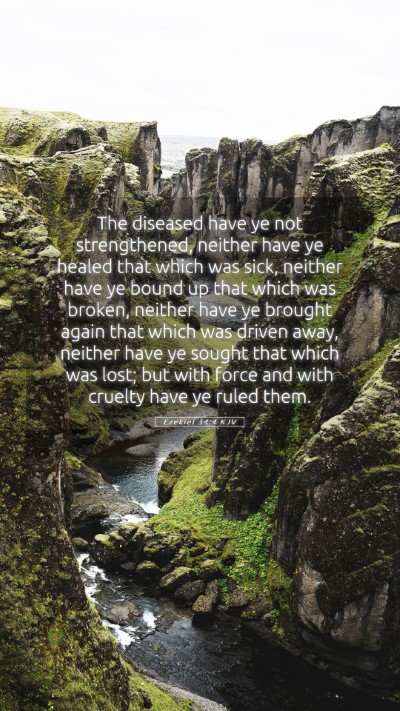Ezekiel 34:4 - Commentary and Interpretation
Verse: "Ye have not sought that which was lost; but with force and with cruelty have ye ruled them."
Understanding Ezekiel 34:4
Ezekiel 34:4 highlights the failure of the leaders of Israel to care for their people, metaphorically referred to as sheep. This verse is a strong indictment against leaders who neglect their responsibility to guide and protect those entrusted to their care.
Insights from Public Domain Commentaries
- Matthew Henry: He emphasizes that the leaders acted more like tyrants than shepherds. Instead of nurturing and guiding the people, they used force and cruelty, leading to spiritual and physical deprivation. Henry suggests that genuine leadership is characterized by compassion, care, and the diligent pursuit of those who are lost.
- Albert Barnes: Barnes points out that this verse serves as a call for accountability among spiritual leaders. He notes that God's expectation is for shepherds to seek out the lost and not be indifferent to their plight. He draws parallels with Christ's teachings on shepherding, illustrating that true leaders must embody the heart of God toward their followers.
- Adam Clarke: Clarke provides historical context, indicating that the neglect exhibited by the rulers of Israel was akin to the actions of shepherds who fail to protect their flocks from danger. He stresses the importance of justice and mercy in leadership, urging leaders to reflect on their responsibilities and the consequences of their actions.
Bible Verse Meanings and Interpretations
This verse serves as a powerful reminder of the ethical and moral requirements imposed on those in positions of authority. It underscores the need for:
- Accountability: Leaders should be accountable for their actions and the well-being of those they serve.
- Compassion: Genuine care and concern for others are necessary attributes for impactful leadership.
- Service: A leader’s role is to serve, protect, and guide their community, reflecting the love and compassion of God.
Practical Applications
In applying Ezekiel 34:4 to daily life, one might consider the following:
- How can individuals in leadership positions better fulfill their responsibilities?
- In what ways can communities support leaders in creating a nurturing environment?
- What steps can be taken to identify and reach out to those who are spiritually lost or marginalized?
Cross References
- John 10:11: Jesus as the good shepherd who lays down His life for the sheep.
- Isaiah 40:11: The comforting image of God gathering His flock like a shepherd.
- Matthew 23:1-4: Jesus' stern warning against the hypocrisy of the religious leaders.
Conclusion
In Ezekiel 34:4, we see a call for true leadership rooted in care and responsibility. The verse serves not only as a historical commentary on Israel's leaders but as a timeless reminder for all in positions of influence to reflect on their impact. Emphasizing the importance of shepherding, this verse demonstrates the essence of biblical leadership: accountability, compassion, and service.
For Further Study
- Explore the role of spiritual leaders in the Bible and how they can apply contemporary lessons.
- Engage in online Bible study groups to discuss the implications of Ezekiel 34 for modern churches.
- Utilize Bible study tools to deepen understanding of prophetic texts and their applications.
Related Topics for Bible Study Guides
- How to interpret Bible verses focusing on leadership and accountability.
- Understanding difficult Bible passages relating to Israel's history.
- Significance of Jesus's teachings on the role of a shepherd.


